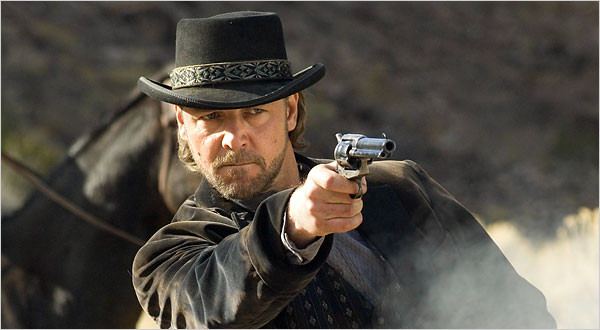The “3:10 to Yuma” Proof of God
by Timothy Gordon
Filed under Movies/TV, The Existence of God

“Yeah, that's why I don't mess around with doing anything good, Dan. You do one good deed for somebody...I imagine it's habit-forming. Something decent. See that grateful look in their eyes, imagine it makes you feel like Christ Hisself.” – Ben Wade
“Virtue is not an act, but a disposition (a habit).” –Aristotle
Catholic philosopher Peter Kreeft famously describes the “Bach argument for the existence of God,” wherein God’s existence is clearly posited by a) the beauty and b) the coherence of Johann Sebastian Bach’s music. God couldn’t fail to have created a universe with such order. Among Kreeft’s students polled about their inchoate path to Christian faith, this simple argument popularly outranks the more technical Aristotelian-Thomist proofs of God. No surprise: in order to convince, such proofs require a good deal more training than most under-equipped, under-educated college students possess today. As such, the “Bach argument for the existence of God” is a nice appetif for the more technical arguments.
I propose an innovation in this vein of aesthetically inclined God proofs: the 3:10 to Yuma argument. In a word, God’s existence is more or less required by a) the beauty and b) the coherence of this film’s commanding moral realism. Both elements countervail upon the powerful forces of Modernist moral mediocrity burnished in most every other film I’ve ever seen. 3:10 to Yuma is moral realism at its very finest. In this Christian morality tale, even the term (“moral realism”) has its definition polished up and reinvigorated, after three or four centuries of ill—even opposite—popular usage.
Conceptually distinct from Kreeft's aesthetic Bach argument and the standard moral argument for God, is a combination of the two: the argument expressing the natural beauty of morality.
3:10 to Yuma restores moral realism from its perverse, longstanding Modernist misinterpretation (i.e. “all men eventually sell out, which is okay in survival situations”) to meaning its sheer opposite, the truer construction that “fiat justitia ruat coelum.” The latter corresponds with what Dan Evans, the film’s protagonist, means when he says, “I’m seeing the world the way it is.” He counteracts the usual appropriation of these words, most often employed by cowards who justify selling out by recourse to a silly dichotomy: moral theory versus the “real world.” When the hammer meets the anvil and moral principles confront life-or-death situations, “pretty much everyone wants to live,” to use the film’s villain’s diabolically commonsense leverage. And up until this film, it has been filmically acceptable to sell out for survival. But Dan Evans is a true moral realist.
The previous misconception of so-called moral realism actually incorporates not one but two toxic worldviews. They are pragmatism—a weak, pseudo-moral argument in favor of comfort, convenience, or survival over principle, (“I just like to do things easy,” as per the film’s villain Wade)—and consequentialism—a weak, pseudo-moral justification of immoral means toward a winsome end (“Every way of man is right in his own eyes,” as per Wade, again). In 3:10 to Yuma both are laid to abject waste.
Upon the epic conclusion of 3:10 to Yuma, the world over, self-justifying cowards and lovers of guiltless creature comforts afforded by pragmatism and consequentialism, will groan in discomfort. (The discomfort of conscience.) Moral mediocrity will no longer avail them, not in this film anyway. 3:10 to Yuma simply leaves in its wake no compelling excuse not to be a man of virtue, a real man.
Misinterpreting 3:10 to Yuma
Sadly, one of the most famous online critiques of this film by Michael Karounos misinterprets—in fact, oppositely interprets—it as “anti-Christian.” Literally, nothing could be farther from the truth. The critique it puts forward runs that in 3:10 to Yuma “honor and truth are shown to be hollow principles,” and that Dan Evans’s “only concern is getting money to buy back his water rights.” Karounos thinks that the film mocks Christianity. Baffling. I’m not sure whether we were even watching the same film! In 3:10 to Yuma, honor and truth are shown to be the only principles worth living (or dying) for—which repudiates pragmatism—and Evans goes well beyond the satisfying of a contracted-for goal—which repudiates consequentialism.
Indeed, the main point of 3:10 to Yuma lies in repudiating what I call the “Gandhi protocol,” a lame critique of Christianity which runs that, “I would convert to Christianity if I ever met a true Christian.” (And thus, the film does the opposite of what Karounos’s critique alleges it does.) The film’s Scripture-quoting villain, the infamous outlaw Ben Wade, essentially embraces just such a worldview until he runs into Dan Evans. In short, Evans is the first non-hypocritical Christian that Wade has ever met. And the arc of the story gives the viewer occasion to scrutinize Wade’s gradual acknowledgement thereof. Just waiting for Evans’s resolve to crack, Wade watches Evans with vigilant interest during their dangerous trek to Contention, where Wade is to be put onto a prison train going to Yuma Prison.
But what will Wade do if and after he finds in Evans a man who will not abandon righteousness—a man who does not at all conform to Wade’s moral categories? Will he reevaluate his own moral calculus?
Up until his confrontation with Evans, Wade associates the Bible either a) with devilishly stone-cold excerpts to say to someone you’re offing (a la Pulp Fiction’s Jules Winfield), or b) with the high standards overwhelming the deeds of lukewarm social hypocrites of the petit bourgeois (as according to the tired, less-than-insightful “Gandhi protocol”). One example of the latter kind would be Byron McElroy, the “Pinkerton” in Wade’s transport posse helping Evans get to Contention, with whom Wade bandies familiarly throughout the journey, as only well-acquainted “frenemies” would do (until Wades offs him, that is). In other words, Wade insinuates that he has memorized many passages from the Bible simply in order to taunt Christian hypocrites like McElroy.
But when Wade comes to know Evans more and more, the viewer finds Wade unprepared to accept the possibility of a man like Evans, a veritably good man, willing to do: a) what is right, b) because it is right, c) no matter the cost. Wade’s eventual moral conversion at the behest of the taciturn Evans occurs in precisely these three progressive phases. When correctly understood, these three stages of conversion are distinctly Christian, which disproves Karounos‘s above criticism altogether.
Moral Conversion in Three (Not So) Easy Steps
Step 1 - Doing what is right: The first step in Ben Wade’s moral conversion occurs when he sees Evans’s plain commitment to doing what is right. This occurs gradually between the beginning of the transport posse’s trek and the (penultimate) hotel room scene in Contention. There Dan Evans arouses profound moral sentiment among all listeners, including Ben Wade, with a speech reflecting his conviction not to abandon the task. Evans will be the only member of the transport posse still willing to see the task completed, in view of the lengthening odds against it. In short, Evans bids farewell to his son William forever, telling him to return home with a parting message for his mother: “your old man was the only one left standing or willing to walk Ben Wade to that train [the payment for which will follow].”
Counterintuitively, during Evans’ simple yet florid farewell, the viewer watches the bystanding Wade much more closely than either conversant, Evans or his son. Wade is clearly moved. Only minutes before, Wade had in exchange for his freedom, privately offered to quintuple the sum guaranteed Evans (for the accomplishment of the task). Evans had turned Wade down. So well before the speech is made, Wade already acknowledges that Evans cannot be bought off.
Yet while Wade is clearly touched by Evans’s rejection of the buyout sum and then by his farewell speech, a keen observer notices that as Wade looks on, he seems at one distinct moment to replace the former notion that Evans must be motivated (not by true goodness but) by money with the new notion that Evans must be more truly motivated by desire for his son’s and wife’s respect. The latter is as false as the former.
Honor is a more noble desideratum than money. Thus, Wade by imputing this higher false motivation to Evans, has taken one step—even if on a mistaken basis—toward conversion. But if Evans were actually motivated only by the prospect of deceiving his son and wife into respecting him, as Wade thinks, this would not constitute true Aristotelian virtue, or doing the right thing for its own sake.
Step 2 - Doing what is right because it is right: Everyone then leaves except Wade and Evans, who are left alone to complete the task and to get to the train station. Half an hour later, the two men flee the hotel amid the gunfire of over forty hired guns (hired by Wade’s gang) aimed at Evans. Wade and Evans make it most of the way to the station—the final destination—by stumbling into a little shack. There, Wade announces loudly and suddenly to Evans that he “ain’t doing this no more,” because “your son’s already gone home, hero.” Translation: I helped you to deceive your boy into believing you went the whole nine yards (because, inexplicably, I like you), now get out of my way as I return to my gang. Return to your family.
Evans seems almost oblivious, and responds by insisting that they must keep moving to the train station. To this, Wade reacts violently. He knocks Evans down and begins to choke him. What insane idea, what daemon, has possessed this strange man Evans?! No one does what is right simply because it is right!
As Wade chokes the breath out of Evans, Wade’s eyes soften. His spirit is converted from violence. We see (as much as we hear) him say, “alright.” He has met his match: one true Christian (even on the tendentiously high standard set on the Gandhi scale). Ben Wade now accepts that there is at least one follower of Christ who will do what is right simply because it is right. But Wade remains unsure how far Evans will go in the name of this right action.
Step 3 - Doing what is right because it is right no matter the cost: As Wade and Evans run together on the final leg of their journey, they are have clearly become friends, at long last. Evans trips at one point; Wade helps him up. Wade’s pursuing gang cannot believe their eyes. The viewer forgets that the two willing men run eagerly toward the train which will transport Wade to be hung at Yuma Prison.
They arrive at the small train station, where pinned down by Wade’s gang’s sniper fire, the two men exchange parting stories in a sort of confessional, as they await the train. Eventually, it arrives late and, through fortune and through the actions of Evans’s son, who did not actually go home, Evans manages to get Wade onto the train. “Well, you did it, Dan—“ Wade begins to congratulate Evans, who still stands on the platform, when interrupted by gunfire.
Charlie Prince, Wade’s evil yet faithful lieutenant, kills Evans on the platform with multiple shots. Prince smiles faintly as he fires shots, just as Wade had earlier promised Evans’s son would happen. Prince then restores to Wade his legendary gun, “the hand of God,” which bears a crucifix on the handle. The viewer sees Wade carefully looking down at the gun’s crucifix—at the One Truly Good Man who ever lived—and finally recognizing that Evans fully followed the example of this One Truly Good Man, willfully dying for the sake of others. Wade is in that moment fully converted; his concluding actions accord entirely with such a conversion.
Conclusion
Aside from jamming its thumb defiantly into the eye of the devotee of American pragmatism and consequentialism, this film will also moisten the eye. And to say the least, this features as an unexpected (if not unrelated) quality in a virtually unsung Western remake with non-American leads—an obscure, Wild West adventure film turning out to be more like a crypto-theodicy. In other words, this film has got more Moby Dick to it than McQueen or Duvall.
3:10 to Yuma is about the big issue, the only one which ever interested mankind: as stated in my introduction, the proofs of beauty and moral coherence defeat the two Modernist neurotoxins pragmatism and consequentialism, the flotsam and jetsam of our age. But mankind has forgotten it.
Viewers do not come before a film of the Western genre expecting to take in a real drama; thus, no one is prepared for this film’s arousal of the spirits or its tear-jerking. And that is precisely why 3:10 to Yuma’s plain meaning—an undeniable affirmation of a personal God and His clear, immutable moral law—rests on the mantle, in so many viewers’ memories, like Poe’s “purloined letter,” obvious yet invisible. Tears constitute an unexpected devotional, after all, even in homage before the usual genres like tragedy or melodrama—recall the mighty Hector slain and defiled in front of his grieved father King Priam. Nor are most viewers of the Western prepared to consume a morality tale…or much less a crypto-theodicy. And even less are they ready to spend part of their weekend viewing a Christian morality tale about conversion and martyrdom! Heavens, no: the genre is too “gritty” and “realistic” for that!
Perhaps true realism and (dare I say it) true grit are more about the Cross of Christ than we formerly presumed. 3:10 to Yuma proves as it inspires. The film’s uncanny crypto-Christianity together with its hidden, tear-jerking poignancy, combine with the film’s unrepentant moralizing (pun intended) to suggest something of an almost mystagogical character, revealing the “way the world really is,” which is to say, the best path for men: the way of martyrdom. This film is sui generis insofar as it spits moral realism back in the face of the consequentialist Western genre. The Western leitmotif of having your cake and eating it too, be damned.
No more saving the world and saving your own skin. That is the stuff of children’s tales. 3:10 to Yuma puts the better to his money: “If you want to do right, fantastic. But don’t forget to pay the toll, which is precisely one death, and keep the change.”
Related Posts
Note: Our goal is to cultivate serious and respectful dialogue. While it's OK to disagree—even encouraged!—any snarky, offensive, or off-topic comments will be deleted. Before commenting please read the Commenting Rules and Tips. If you're having trouble commenting, read the Commenting Instructions.












